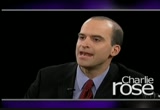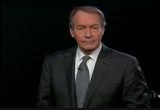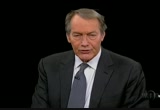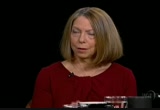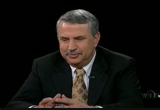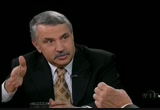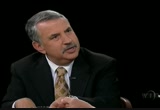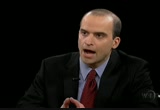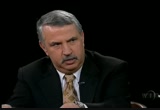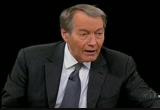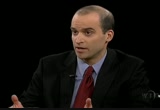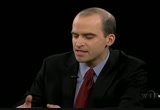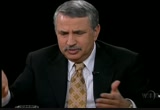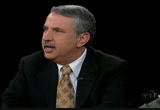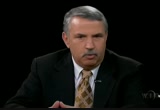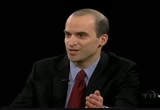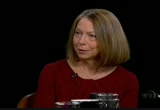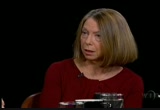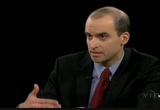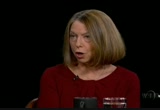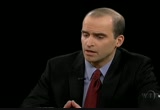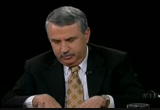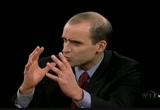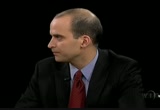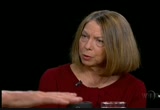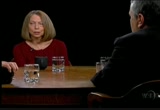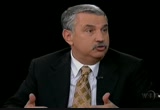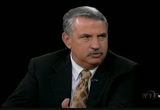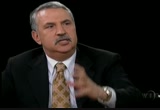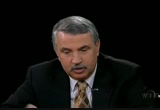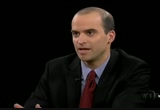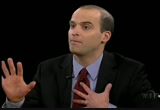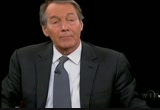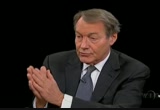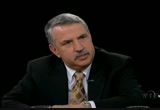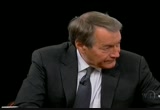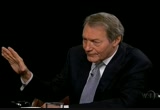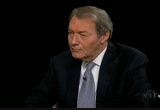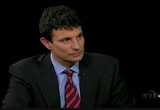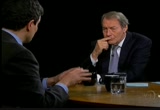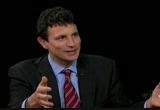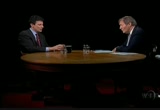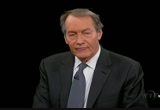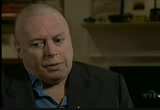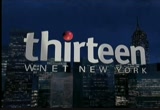tv Charlie Rose WHUT December 17, 2011 3:00am-4:00am EST
3:00 am
>> rose: welcome to our program, we look back this evening at 2011 and ahead to 2012. with jill abramson, the executive editor of "the new york times", tom friedman the columnist and the bureau chief in washingn david leonhardt. >>lways in hindsight it's perfect 20/20 vision. i think in realtime journalists worldwide covered what was going and you know, saw that something big was developing and spreading. >> we're going to put 2011, charlie n that list of 1989, 1848. it's going to be one of those years. you feel right now we're present athe creation again. you know, we are all present athe creation of
3:01 am
something. but what's so interesting about this, it feels like after world war i, after world war ii, after the cold war but this time there was no war. but we are seeing states tumble as if there had been a war but this time there was no war. >> i think of that as really the central question about iraq as we are leaving and about all of the arab spring. do we see this incredibly important strategic region of the world? start to follow a path of china and india. or does it remain vastly behind and not even catching? >>. >> we continue this with david recommend nick-- remnick the editor of "the new yorker" magazine whose article in the current issue is called the civil arkansas how far with the resistant to vladimir putin go. >> i don'tant to say that anything equals anything else but remember egypt that initial outburst was largely middle cla. it was largely people who had work, even in a country with very, very high unemployment rates. russia has very high employment.
3:02 am
russia is an older society than egypt. i don't expect a ta require square type scenario. but still, there are analogies to be made and they're very vivid. >> we conclude this evening with an appreciation of christopher hitchens who died in houon on thursday at age 62. jill abramson, tom friedman, david leonhardt, david remnick and an appreciation of christopher hitchens when we continue. funding for charlie rose was provided by the following:
3:04 am
>> 2011 has been a remarkable year. in the middle east and north africa wave of revolts toppled regimes in tunesia, and lib ya, in the europe the debt crisis intensified revealing deep cracks into the your pain project. in the united states a protracted debt talks and supercommittee sparked a crisis of confidence in washington. in foreign policy the death of osama bin laden and the end of the nearly nine year war in iraq were major milestone force president obama. but the economy remains week and unemployment remains high. and that continue to dominate the debate as we head into the 2012 presidential campaign. joining me now to look back on 2011 and ahead to 2012 a distinguished group from "the new york times". their executive editor jill abramson, columnist tom friedman and washington bureau chief dave leone hart, i'm pleased to have them to talk about these moments events and rejoin me here at
3:05 am
this table. >> let's just tart with the arab spring. >> yh. >> rose: is that the story of 2011? >> it's always hard to say the story but i was just upstairs near the photo department at the times yesterday and we were reviewinthe photographs that we took and inn all the countries. first tunesia, then egypt, on and on through libya and it takes your breath away. both the breath of the story, the way the protests developed. of course the political uncertainty now about whether it all leads is such a tremendous story and will definitely carry us into the next year. but looking at photos again and the images whether they were in tahrir square or when photographers were taken in to photograph qaddafi's dead body, i mean
3:06 am
just the arc from tunesia on through libya is really something. and i don't think any one foresaw in the beginning days the breadth and scope and that right now we would all be focusing on the instability in syria. >> rose: where do you think it is today in a broad sense terms of its power to dominate 2012? >> the arab spring, charlie. >> rose: yes. >> yeah, we talked about this because you and i were together the night mubarak fell in tahrir square. one of the things i remember about being there th week in egypt is that some day i would love to design a journalism course just aut that week. because i don't remember if we talked about in in cairo, charlie but my rule in that week has been my rule ever since, is that whenever you see elephants fly, shut up and take notes. i felt like in cairo elephants were flying. we were seeing things, when everyone tells me the arab
3:07 am
spring is going to be this, going to that be it is going to be wonderful, internal. you didn't see it coming, what makes you think you know where it's going, okay. shut up and take notes. and so that's really my overarching, you know, attitude right now, charlie. what strikes me is several people have pointed this out there was a saying after the russian revolution, democracy revolution in 1990 and it is a lot easier to take an aquium full of fish and turn it into fish soup than it is to turn fish soup back into an aquarium full of fish so we see fish soup being created in egypt n syria, in tunesia, in libya, maybe, who knows in russia. but i think the story of this year will be a the continuation of that trend but also the challenge now of reinstituting the society based on better governance, w constitutions-- institutions, a different kind of leadership and a different kind of citizen. and i think that's really going to be the great drama of this year. >> rose: syria, for exple, you have said is different. yeah.
3:08 am
>> rose: why is it different? >> syria is really the keystone of the whole-- turkey is different than syria because there are kurds. lebanon is interested in syria because all the lenese confessional groups, are mirrored in syria. isale interested because there are thousands of palestinian refugees there that syria has had a hold on across the golan. iraq is interested because syria is ruled by a shiite offshoot now but if the revolt revolution continues it will be ruled by a sunni majority and iran is desperately interested because syria is its bridge into the arab world so what i have been saying from the beginning is tunesia implodes, egypt implodes, libya implodes, syria explodes. if syria goes in a violent way, every one in syria will reach out for help outside. as they did ding the lebanese civil war and everyone outside will look for proxies inside because which way it goes will really affect the balance of power between iran and saudi arabia, between turkey and the kurds, between all the lebanese groups and lord
3:09 am
knows-- . >> rose: it is not simply whether assad stays or goes, it is a question what comes after. >> exactlyment it's how the place ge ri constituted. i think what is so interesting about this year, because we're going to put 2011 in that list of 1989, 1848, it's going to be one of those years. you feel right now we' present at the creation again. you know, the dean achison, all present at the creation of something. at is so interesting of this, it feels like after world war i, after world war ii, after e cold war but this time there was no war. we are seeing states tumble as if there had been a war, but this time there was no war. it's happened through these internal waves. inside countries and spreading to others. >> rose: marked by extraordinary act of bravery and courage of people who knew that they risked imprisonment or death. >> i believe my call owner is right t was exactly onier ago to jill's point, just one year ago that a ton esian food seller burned himself alive and that start the whole thing. >> rose: one event.
3:10 am
>> one event, one man. >> rose: it's incredible. the a bomba administration. do they-- obama administration do they choose between universal values that they articulate and strategic interests. >> they don't love strategy. obama loves to describe himself as a pragmatist. which i find to be something of a frustrating label because you can fit anything you want into pragmatist. but there is a good side to it which is that you take events as they come and deal with events as they are, not as you want them to be. and i think what is interesting is that to contst how good their foreign policy has looked this year with how flawed their domestic policy has looked. you sort of set that up in the open. whenou think about both as tom has written, how they carried out bush's foreign policy even more effectively than bush, with the killing of bin laden, with the killing of numerous top leaders. >> is that foreign policy or a military strategy of antiterroris >> that a military strategy which is part of a foreign policy strategy but then you extend that to the widely mocked leading from the behind in libya, which seems to is have worked.
3:11 am
it's hard to know whether they could have managed the arab spring better. but it's easy to know that they could have managed it a lot worse. and so when you look at the foreign policy i think you see a series of things that have been flawed in certain ways but overall i think you have to give them relatively high marks for how they've managed it and acknowledge not only that they've made mistakes but also that most of it is out of their control. they don't deserve credit for the arab spring. they don't deserve credit for the fall of qaddafi. >> there is obviously the danger of the perception around the world that we've been behind itll. >> thas right. and that's part of leading from behind. >> just think, if the election were tomorrow to pick up on david's point, charlie, i think national security would actually be a plus for the democrats. it's been a long time since the democrats were able to say -- >> the public say that to me, people like george wills. >> that we're the party of national security. >> and domestically there's some anger ove that because in terms of legal approaches that's been consistent with bush policy too, in many ways which is anger the
3:12 am
liberal base of the democratic party. and wouldn't wouldn't have been predicted, i don't think. >> and where is saudi arabia in all of this. >> i think clinging, just clinging to hoping to hold on to power with this, you know, october ten again ian elite i think. >> with lots of ney to spend. >> i think what is really interesting out this moment, what i find scinating is this. you have these two to we ares. iran and saudi arabia, that have both been dealing with modernity, one from the shiite muss lem perspective, one from the sunni muslim perspective but with oil. oil allowed them to buy all, they could buy off people, opponents. now what you are going to see is the center of gravity of arab islam which is actually egypt, home of the-- university, the central learning institution, of arab islam, has to deal with modernity with no oil. and i, areou not going to buy off any contradicon, not even do women work or do
3:13 am
they not work. do we have tourists or do we not have tourists. do we have modern education or do we not. do we globalize or do we not. but they can't as saabee arabia did, buy off those with oil. now you will see, i think, arab islam's real interaction with modernity. and i think it's going to be fascinating and i think they can't predict and can't how it's going to go. >> rose: but let me look at this important eve coming, already happened, iraq. >> yeah. >> rose: and the depar ture of america from iraq. do we yet know what history will say in the end about the united states involvement in the country? >> i think we know some of whatt wi say. but i don't think we know the headlines or the title. i think-- . >> rose: or the conclusion. >> or the ultimate conclusion look, i think we know that the war planning waseeply flawed. i think we know that the managing postwar was tragically flawed. i think we know that saddam was a terrible and brutal
3:14 am
tie rant. i think what we don't know is whether you ultimately put it into some narrative of the arab spring, that includes progress. i don't know whether we ultimately will put it on a list of things. >> as the early democratization, right. >> i'm not saying-- that strikes me as really hard to believe. but, but as one of the things that was bubbling up. we talk so much about inequality in this country. i think it's worth remembering th globally a lot of inequality has gone in the other direction thanks to china and india. some of the poorest places in the world have come up, right it has not been the rich pulling away from the poor. that has not enthe only story. it has been part of the stor globally to tom's point about people looking at the beijing olympicand to jill's first point about this being the story of the year,he story this is why this is different from europe and from our slow down as important as they are. this is a question of does the arab world join china and india in closing this gap with the modern world.
3:15 am
and iraq -- >> do they accept modernity and do they accept the kinds of policies that china and india have folwed in ord to generate the kind of economic success they've had. >> yes, and it doesn't necessarily have to look just like china just like china doesn't look just like the united states there are multiple product el. it seems like you need to move toward a market economy. we don't yet know whether you need to have democracy. china doesn't. but i think of that as really the central question about iraq as we are leaving. and about all of the arab spring. do we see this incredibly important strategic region of the world, starto follow a path of china and india, or does it remain vastly, vastly behind and not even catching on. >> and a question there is the role of women and how that is a key question in terms of whether the push for modernity -- >> you know, charlie to your point to your earlier
3:16 am
question to jill, there are people who did see it come, they were the authors of the arab human development, in 2001 and what did they say. at rab world is behind. devastatingly behind for three reasons. a deficit of knowledge. a deficit of women's emporment and a deficit of freedom. and e real question now is will the societies be able to get organized enough to david's point to really start to overcome those deficits. >> i mean the failure to build the institutions and invest in education and not have you know, an underass that's joblessness,ou know, is pervasive and hopeless. i mean people, you know, are wondering all the years that we spent billions and billions in aid to foreign aid to egypt and none of it went to those broader societal -- >> most went to the military. >> exactly. >> in egypt -- >> but now in then it all crashes. >> 30 to 40% of the women in
3:17 am
egypt are he limb-- illiterate. if i got to write the charges against president mubarak t would be just one crime. the soft bigotry of low expectations about your own people. how many times did you talk to him, i talked to him, say you don't understand egypt. i understand egypt. i know my people, you know what i mean. and what he knew was they're just fine the way they are. a little change, and we go slow here and we're like the nile and all this stuff. and meanwhile, you know, think of this, it's just after billions in american aid, almost half the women in egypt can't read? do you know what that means if are you up agait china. china and india they are also not going to really feel sorry for egypt. we'll just sit here for a couple of years while you catch up. they will have to catch up in this hyperconnected, hypercompetitive world and i think they can do it but they have no time to bass. >> there is great bit of research that looks the wage boost that people get when they leave a country and go t another country, to try to measure how broken a society is. if everyone leaves your
3:18 am
country, it's a huge wage boost when they go to somewhere else that suggests there is something wrong with your country. >> and also that they are never going back. >> and that they are never going back, that's right. >> and egypt is near the top of that list. >> interesting so it is two things. it's that people are not educated and those that are can't even put it to good use to prosper in their own society. >> in their country. >> yeah. >> let me move to russia. what's the expectation as to what might be going on in russia, not only because puticoming back to power but also pr test, and do they view these protests as some sense of inspiration from what's happened in the arab world? >> i think it's really hard to knows what's going to happen in russia to be honest about it. it's one of these situations that seems to have changed relatively quickly, right. we all thought putin was in control. >> you know, charlie, i think yoought to see the russian thing in a global context. i don't know whether putin is coming or going but our
3:19 am
mutual friend were talking about this just last night because ink about russia, netflix and bank of america. putin, netflix and bank of america what do they all have in common. they all were trying to lead by ordering from the top down. netflix said we're going to change pricing. and guess what all their customers got the other, oh, really, we're out of here. they d their own arab spring, bank of america said we would like to charge you five more dollars for your debit card and their customers got together and said no, you're to the going to charge us five more dollars and putin said i think i would like to be present again and all his cuomer, all his tens-- citizens, no, you're not go stock president again, not so fast. so i think it is part of a broader phenomenonhere leadership now is no longer a one-way top down monologue. it's got to be a conversation. >> tom, don't you think that has aton to do with technology. >> absolutely. >> is the democratization of everything again which i this is the real reason why did all this toppling happen without a warrant. it's because we've had the democratization of everything. finance, technology, information, war making. and that actually was the
3:20 am
whirlwind that swept all these things out of war. >> okay. but then look with that in play, look ahead to where that might have its biggest impact, beyond let's assume it has some impact in russia. >> let's start here. >> okay. >> you and i talkedefore about americans elect which is an i think the chances of them fielding a third party candidate who will be expect any this election even though they intend to be i all 50 state ballots still probably small. they have to get the right person but i think it's the beginning of something. because if you think about it, charlie, in our own country every hierarchy has been toppled. "the new york times" has been challenged, book stores by amazon, music by apple, every hierarchy except one, the two pty system. now how long do you think that's goi to last? so i think that it is the beginning. this may not be the election that they do it but i think it's the beginninof something. >> there is this interesting strategic question of if you do get even a modest third party effort this time,
3:21 am
without does it hurt more. the argue for why it hurts obama more is that their positions are likely to look more like obama's than the republican nominees. when you look at the lists of what third party -- >> like someone like ron paul. if it comes way from the right then clearly it will not. and you could have four party, someone like ron paul would clearly hurt a republican nominee. the argument for why it would hurt a republican more, actually heard from a democrat recently, which is that it's the whole question of referendum or choice. there may be a certain number of people out there who want to vote against obama because they're disa point-- appointed at how it's gone but they don't want to vote for a republican follow knee who adopts a republican platform. is so you can sort of imagine a situation which some of the people who might want to vote for the republican to cast some amountf disapproval with obama instead go to this third thing and obama could then win an election as bill clinton did both times with less than 50% of the vote. >> yeah. >> kind of -- >> let's look at the political race so far. and-- we like politics.
3:22 am
>> are youstunned that newt gingch with all the quote baggage, the word often used about him, is doing so well. >> i'm partly stunned. i, you know, spent 20 years of my career in washington and covered in 94 the gingrich rise, the republican takeover of the house,-- one of newt as king of washington. >> rose: and brought down by his own people. >> brought down by his own people and by his own behavior and transgressions. >> who were dissatisfied with everying from h somewhat chaotic leadership to let's face it, some of his zany ideas. >> rose: okay, but do you think the rise of newt is -- >> i have yet to finish the thought so i witnessed that and i guess as a reporter having covered that, it seems totally improbable to me that we see him rising as the front run never both
3:23 am
iowa and new hampshire right now but i think that newt gingrich isn't the reality for a lot of peopleho are only tuning in this election cycle. and mainly know him as a celebrity on fox news, who seems comfortable in h skin, who is, you know, coming forth with ideas, whever you might think of them. he seems genuine. and he's sort of a megawatt celebrity because he has been on fox news so much. and you know, we recently did a story about, in a way, the decline of retail politicking in places like iowa. i was going to go out there this week and i was told don't come. you won't see any candidates doing anything except they're coming for the debate. and instead it's -- >> it's television. and so the newt that we see on the debate stage is eye
3:24 am
different newt for a lot of voters who don't remember anything about 1994 now. >> rose: how do the mney people analyze their inability to break through that 24%. >> i think, i don't think they will say this on the show, okay, but i think if th were being completely honest about it they would cite a number of things. mitt romney has many, my strengths. retail politics is not one of them, right. i've been on the stump with him. he is-- he is not a bill clinton, right, no one is a bill clinton but he's not so that hurts him. >> rose: no one is. >> he does sort of suffer d this is related the first point from some of that same notion of elitism that obama suffers from. he doesn't seem like part of the the 9-- 99%. i think there is an unknowable issue with how many people don't want to vote for a mormon for president. the polls certainly suggest that is an issue muchs they suggest that race. >> ros but you are saying the people like governor of south carolina who is a woman, a huge tea party supporter endorsing him that ll help make that argument
3:25 am
becausshe is strongith evangelicals and the other argument is that they may want to win so bad that if in the end they decide that the best shot to beat the president is mitt romney, they will come around. >> that's right. >> and the ultimate thing is look, he has this history. he called himself a progress. he called himself that. >> his struggle is one we've seen other republicans have, which is an order to get the republican nomination, he is not acceptable to the base of the party. but in many ways, is, you know, a stronger candidate in the general election because, you kno, some of his views aren't are more moderate. but whether that romney will be recognizable if he survives to get the nomination is, will be interesting to watch f this drags out. people are now predicting that the republican primary and caucus process may go on the way the hillry-obama one did last time.
3:26 am
rose: do the obama people look to romney as their worst possibility. >> yes, they do. although they're not terrified of him, i think they think that he is more flawed than perhaps the conventional wisdom suggests, they think the republicans have done a weak job of running against him. you saw them put out an ad that was one of the more effective anti-romney ads so whatever they say, they are clearly more afraid of romney and all the polling suggests they should be more afraid ofromney than anyone else. but they also think that given the unemployment rate, they have not inherited the worse field of republicans that they could have. and that's true. you look at people like mitch daniels and jeb bush setting aside his last name for a minute which obviously is a hindrance politically right now. >> christie. >> i mean all these people there were a lot of really serious candidates. i think mitch daniel kos have caused major problems for obama. i think christie could have. >> don't you think the key question as all of them looked at the same electoral
3:27 am
map, all of the people you mentioned looked at the unemployment employment, the economic figures, and something made them shake their head and say i don't like what i'm looking at. you know t seems like it should be a good year for a republican challenger. >> one of the things they -- >> they said no. >> say about gingrich is one of the things i may have missed it, but no one has quite explained to me, so how did he go from 0 t 60. and speaking from the commentators, there's been a lot of people just reminding us how awful he is. but i feel like we haven't really fully explained. >> i feel like we ought to ask that question, absolutely. >> and there's a little bit of-- what i have been just listening to the debate last night and i'm trying to think, i'm trying to think about it what is it appeal being this guy, in the current context. and there's two things that come across to me. one is i think they're looking for someone who could be as mall i flues, articulate and go toe-to-toe in a debate with barack
3:28 am
obama. there is a hunger for that in the republican party. >> they want-- they -- due a smart rrior, you know what i mean. i think that's one. the other thing that struck me, there he was with a straight face saying i took 1 my 6 million from freddie mac and i did know-- what that means is you are the most well paid history consultant in america, okay. but you know what i felt, watching tv, i felt like that audiee just doesn't care. it is that we want our guy. we want someone out there who can fight. i think the audience, we know are you all crooked. you're all flawed, his is money, your iss nutiness, yours is you are a private equity. i mean i just get this sense that they really want someone they think is smart enough, and articulate enough to go toe-to-toe and really to overlook everything. i think we is have yet to be careful we don't underestimate that. i think that is a powerful thing. >> will this election in the end be a referendum on president o-- obama or will
3:29 am
it be a referendum on without best understands the future. >> i thinkhat if the economy gets significantly worse it's probably a referendum on obama. which is to say i think he would probably lose. if we have, we haven't talked about europe yet, we spent a lot of time thinking about europe, so does everyone at the times. if europe really were to send us into another recession i think it becomes a referendum and i think his ability to win is very, is very difficult. if it sort of stays where it is now, then we're going to see this titanic struggle in which they try to make it not a referendum. >> rose: i will come back to that bause you opened up europe and europe could play a role in this campaign. and even the president has said that. how could europe throw america into a recession which would end the obama chances of re-election? >> i mean the brief answer to that is that recoveries from financial crises are incredibly weak and incredibly vulnerable to anything. we've seen that this time, right. we start to get a little job growth and then europe happens or then we get
3:30 am
something else like the debt ceiling negotiations and we get off track and that's because people are scarred. they're scarred by the debt, scarred by the crash. an anying rel i difficultly mod committees shake their confidence. the european economy having fundamental problems is not something relatively modest and so if europe looks like it's going to break apart f there is uncertainty about how they will y off their debts which there are, that last deal doesn't deal wi those tt shakes rkets here t shakes consumers here t shakes busess executives here. >> it shakes faith in the banking system. >> so people are already worried about spendinmoney b hiring that next worker, about buying that stock and then europe is in the back of their mind. and it just is one more reason not to do it and it feeds on itself. >> do we assume that the most recent summit has failed? >> i would say it has not succeed. i wouldn't say it has failed. >> yeah, it-- it isull of problems and not seen as a long-term solution at this point.
3:31 am
you know, despite merkel and sarkozy, you know, holding hands with her, the efforts to do something bold. >> here is another interesting question. >> it really wasn't in the end and i think as the days toll and people pick apart the agreement and you know then you have britain's refusal to go along. that it's like a very complicated cture that isn't the strong decisive, broad action that i think many people were hoping for as a solution. >> the thing tt fascinates me is the idea of the u.s. in our future, and our clearly you have written aboutn and all of us thi about this, and it has to do with issues of american dedecline-klein and all those things and the rise of the rest but it also has to doith america's power and relevancy to big issues. we did not have a huge influence on the arab spring although we had some influence as you said in libya, for example. and if we had any influence
3:32 am
on this european crisis, all those trips over there. >> i think you know it's easy to say. >> are we relevant to the solution. >> i think we are relevant and i was actually just in paris a week ago. i was talking to-- trishay who was crediting geithner. >> as doing what? >>s alike showing. >> you know that america is fully engaged in this. as trying to pusfor th deeper, longer solutionsment because obviously obama's re-election being tied to the global economy means that they would like to see results pretty quickly by november. and i think it just his presence, his intelligence in dealing with therray of issues that are on the table now, that we are getting a little bit of credit for his role. >> but we ar not going to solve it on our timetable.
3:33 am
>> but in the past -- >> we would have been able -- >> it went t china for money and china said no. >> right. >> they knew they couldn't even think about coming to us. >> right. >> it's like you know, your father-in-law. don't even think about coming here, okay. >> we don't want-- we have no money. >> we have no money. the atm is closed so at the end of the day we n do it through the imf that is how we would do it but eve there there ll be no marshall plan for anydy here. >> but all of thiss now wrapped up in the political season. that's the thing. >> meaning -- >> meaning that the entire administration right now focused on a short-term game. yes, they know these are endemic problems and they're engaged in the various efforts to are, yo know, keep country as float. but they need for not a huge meltdown to happen anywhere near the election in november. and that's now what our policy is going to be all about. >> hmmmm. >> when you looked at this
3:34 am
president, we've had conversations with him, we've been as he met with columnist and perhaps more, what, how is your assessment of him changed? what has he not been able to do that he thought in all the u for of 2008 he might be able to do. >> voted for him for one reason. i thought he would change the polls, not read the polls. i thought he had that ability to articulate and galvanize a transformational agenda on some rlly key things, energy, debt, deficit, et cetera. >> rose: and the fact that he didn't is because he didn't have the -- >> i don't want to-- let's store of-- sort of-- i think he deserves and has not ceived the credit he deserves frojust prevting us from going into depression, from what he inhered i think extending health care to millions more americans and even though we haven't addressed the cost issue which is complicated and certainly didn't have much
3:35 am
republican help say big deal. i think saving the auto industry is a big dealment and he just got through a regulation on mileage standards that is going to double mileage standards in this country, you know, over the next decade, 13 years. that's actually go stock phenomenal it will have a huge impact. so those who say de nothing, minot ready to say that. at the same time, for reasons that you know joe and david have already articulated. ultimately he was there to puts on a susinable economic path to recovery and puts in a position to succeed in the 21st century. >> why didn't he. >> he will tell you he tried for a gnd bargain. their line is this, the republicans from day one wanted to subvert us. they only wanted us to fail. everythi they did was in that direcon. and therefore we could only, you know, i tried to do a grand bargain with boehner and he walked away. republicans have a different narrative. my approach is very different,or is between-- okay, i will grant you, republicans have been trying to subvert you from day one. but you know what we need. welcome to washington, okay.
3:36 am
here's what you didn't do. you tell me yo were for a grand bargain, you were really-- did you srand bargain i was for a grand bargain. does anyone here know what was in that specifically. okay. >> rose: what did you put on the table. >> my point is when that failed, to me, charlie, he should have gone to the country and said look, erskine bowles, allen simpson, hitch up your wagon. we're going to snd a month going from one end of this country the next saying here's why this grand bargain is the thing we need. and leverage independent, centrist democrats and centrist republicans. i would bet, who could know-- that 30 days of that and he would have boehner back at the table. >> okay. >> right. >> but i actually think your best column on obama was at the risk of pannering to my colleague-pandering to my colleague was about the communications failure. that he just has-- it isn't
3:37 am
the dividual policies, it's the failure to create, understandable narrative around tm. >> he had a brilliant nar any 2080 also. >> i have been dying to ask tom this, and it's possibly an a proct fall story but i'm told one o the gaerings that obama had with columnist you were speaking up andsayi what you need to understand is you can't say something once, you can't even say it only three times. ve at least, and in the same words and you know, you cite health care. that is a big achievement but how many americans can tell us what actual it did. it is transformational and he november spoke about continues . >> how do he react when you said he had to explain it, keep saying it. >> rose: the question of always wanting to ask tom is what? >> is that true what de say?
3:38 am
>> without-- it is said, you know, that-- that i-- what i tried to communication-- kpun kate and i think we have all had this experience this is actually the worst, i have been in washington since 198 the this is the worst communicating administration i have ever had any experience with. i have never seen people so bad at telling their own story, okay, like real achievements, okay. and i don't understand it, frankly. i assume it starts with the president. but at the same time, you know, there is again he did these really important things. but if he end of the day, i feel like axelrod's in the room and saying mr. president, we need to win the third district of pennsyania, there you cannot use the word, phrase climate change for the next 18 months. and rather than say no i'm actually going to change the polls on that, i'm going to change the polls on the grand bargain. we lost to boehner but we actually never-- he's never leveraged us. he never-- us, i mean the
3:39 am
american people. you know, his own constituency he's never brought that pressure on republicans. now a little bit they did it around the payroll tax cut. and actually, it seemed to get some traction. and i just, what worries me now, charlie s that we're going to have election and he's going to try to win by 50.0001% of the vote. >> and so what-- so he is going to get re-elected, but with no mandate to do the right thing. because i think-- maybe i'm wrong, i think the american people totally get and i think they want three things. they want a policy that is at the scale of the problem. okay. and for me that's simpson bowles or something like t okay. secondly they want one that is fair. rich pay more. rich had a very good two decades but everybody pays something. this is a nationalroject. and third they want something that's as operational. that's not just-- i'm here to balance the budget. no, we're here to make us great again, you know, as i said i'm not a green eyeshade, i'm a fourth of july guy, so contract which
3:40 am
dones do you thi mitt romney could me that. >> i don't think so. i think if i were advisin romney i would say torrow, simpson bowles is may plan. my plan is the president's plan. the one that president obama reached out. >> that is what i would do. that would be an interesting campaign, i'm running on your -- >> what do you think -- >> one of the paralyzing things for the administration in term of simpson bowles, in terms of seriousdeficit reduction in changing the polls, is this promise they made in the first campaign not to raise tax on anyone making less than 2 -- 250,000 a year. when you combine that with the success the republicans had as casting them as big government, old big government liberals, they feel they're in this box in which if they adopt simpson bowles or any serious deficit solution, any serious deficit solution involves taxes on people making less than $2 50u-- $50,000 or you have to get arid of medicare. and so they feel like they're in this box in which if they do that, this isn't
3:41 am
defending th t is explaining what they think f they do that, the whole campaign will be see he told you he wouldn't raise your tax. we told you he was lying, then he spent all this money and to pay for it he will raise tax. the white house is terrified of that narrative. and i think that terror correctly or incorrectly has kept them from trying to take this risk in which they go outnd tell the american people the truth. a truth at quite frankly a lot of us don't want to hear. i want my social security, i want my medicare, my military and i don't want my tas raised is the way many of us feel. i think what has kept them from going out and peuading that everyone needs to make sacrifices is that very electoral fear. >> and don't you think the window is closing. >> yes. >> i mean the time to do that was-- . >> rose: it has closed. >> yeah, i would say it is closed. >> i think if we could give obama or axelrod or any of them truth serum i think what they would tell su that he has the ability to do a lot of that in the secretary
3:42 am
term, sily because of the expiring legislation. a lot of stuff expires that will reduce its deficit. and can stand up and give people the hard choices that he hasn't been willing to do in a first term. but there is a real question, will he be willing to do it in a second term and will he have the strength as an secretary term congress. >> and what will the congress look like. >> if he had acted differently, would we be and would he be in ray different place which is your point in terms of boldness and leadership, in the end it seems it is about leadership, about an ability, regardless of what the apparatus of communication is in the white house, the ability to show the passion and the care and the touching so that big ideas resate. and it's going to the country. >> think would be. and even what i would say, charlie s that i understand there is nothing going to happen in the next 12 months. the republins aren't going to agree with something now. but my action would be run on this so if you win. >> i think you will win, if you go big. not if you go small. >> by going big you
3:43 am
also-- you wrote a column about that, going big and some people said what tom is doing is saying that the president has two alternativ. one, can go big and in a sense go for the center, where the alternative is simply to become very populist. anattack the republicans and say basically. >> and maybe win by -- >> i think if he went big -- >> that was the choice s that the choice he has? either to go big and basically go for the center and all the grand bargains that might be there, or to become sort of part of the stewart of the 99%. >> that's probably a fair calculation. >> it's a risk. if he goes big, i think he indecember-- increases the odds that would have been a transformational president which was his aspiration. i also think he increases the odds that he loses and some of the accomplishments that they are proud of that tom talked about get undone. >> he may have misspoken when he said this but you remember this, he has said i think in some convsation i would rather be a one term president who made a difference than simply to be --
3:44 am
>> he hasn't acted that way. >> that's my point. >> the question is you can be a one term president who make a huge difference. >> no. >> every one term president has failed to win re-election has been seen as historas a failure. >> i actually think that most presidents don't do well in that second term. >> often true. >> i mean think about it. >> and i think if you took this risk people, what's been so missing i our politics in general, not just from obama. when was the las time, look at the-- when was the last time somebody surprisedyou? did he just say that? and not some loony thing like i took 1.6 million to teach history to the freddie mac, no, where you said wow, she really took a risk there, i think people are starved for that, charlie, you know i may have been project. i don't ow. but look t we were talking about this, look at the floating vote. romney is up, he's down, gingrich is up, third party is up, down. the electorate is so
3:45 am
volatile right now. and i think partly because they haven't found the person that they really feel is talking straight to them at the scale of the problem. i think people are really worried. >> well, i agree with that. i also think that they are inherently at times liking this, you know there is on the part of people a sense of show me strong leadership. and the-- the politicians is let me get elected first. and therefore there is the collision of interest right there. >> it's true. but i think again it's linked to makingpeople understand why you are taking bold action why it has to be done. keep explaining. >> i asked someone whose name we mentioned here, what was his-what was his problem with obama and he said he's not as gifted as explaining things as i thought he might be because he was so good at that inoperation. >> everyone wrote so much during his firscampaign about being so professorial
3:46 am
and you know, having seminars and having an ability to explain. but maybe in too complicated away. >> i asked him in 2008, i said reagan had a very simple narrative, less government, cu taxes, et cetera. s with's yours. and we ran the whl quote in the "new york times" magazine because it was so telling. it was intelligenc intelligence-- intelligent, nuanced and long. and it was not a particularly good narrative. >> thank you, did. thank you, jill, thank you, tom. pleasure to have you here. >> rose: david remnick is here to talk about russia. recently witnessed so biggt demonstrations since e collapse of the soviet union. last weekend tens of thousands took to the streets. demonstrators were demanding a recount the cember 4th parliamentary elections after widespread allegations of electoral fraud. there is also growing anger at president putin decision to run again for president in march. prot tests are the biggest grass roots challenge to
3:47 am
putin since he took office 12 years ago. another major demonstration is planned for december 24th. joining me now as i said is david mnick, editor of "the new yorker". mi pleased tot jhaveusreturnedh because he just returned from russia. his new piece this week is called the civil archipelago, u had far can the resistance to putin go. welcome. >> thanks for having me, charlie. >> tell me just where you put russia in your own spectrum of sort of ongoing interest. >> i go back there and i dive right back in as if i have never been away. i have to tell you this last trip that i took was its first time i felt politically thrilled, a sense of possibility that i haven't sensed in a very, very long time. there have long been this group and that group and that small paper and that isolated radio station. and putin knows that can no longer have a premodern totalis totalitarian system, it's too expensive, too
3:48 am
repressive t would get rid of all foreign investment it doesn't work any more. so instead he jails-- a couple journalists get murdered over here and everybody knows the rules. it's a kind of authoritarianism rather than totalitarianism. and those gups existed. now they are coalescing, and because of these obviously dirty elections and all this kind of preempt tore way it was announced that putin would just switch places with med ef ved-- med yesterday ef it was decided in secret that any plemen plement-- element of democracy was a fraud this infuriated people and infuriated particularly people without have benefitted economically in the last t years because of stability, high o pric above all and all the rest, these people feel offend. he ved-- offended so to see 50,000 people on the streets. >> rose: offended by the arrogance of power or -- >> because when you have just, when you have finally a piece of bread then you
3:49 am
want something else. then you want something else. you want a sense of being able to hold on to that piece of bread. you want to have recourse to fair courts, to rule of law to a sense of decency in your society that is absolutely -- >> does he want to have this kind of bargain that som dictators have which is ilie take care of the state. >> exactly. >> and ilie provide for you but as far as the state is concerned i'm running it, it's pie baby. >> and in the wake of the chaotic, yeltsin years, that bargain for the vast majority of people who started to enjoy a sense of economic stability and upward climb never mind that it was undergirded by high oil prices, they are willing to put up with that. okay, you can hav politics over here. i'll take my first trip to paris. i'll get a better apartment, i'll have a television set, maybe a r. i'm not saying that the middle class is anywhere near the scale of what we
3:50 am
understand it to be but it was happening. but now that class that has an iphone, that has internet access, they want something else. i don't want to say that anything equals anything el. but remember egypt. that itial outburst was largely middle class it was largely people who had work, even in a country with very, very, very high unemployment rates. russia has very high employment. russia is an older society than egypt. i don't expect a tahrir square type scenario. but still, there are analogies to be made and they're very vivid. i do think he'll win a presidential election in march. probably, yes. but something, something very vivid has changed in the last couple months. >> and how does it play itself out? >> well, the question is will these demonstrations just be isolated incidents, and then they'll kind of calm down and disappear into the vast more as of eternal vast russia or will it have
3:51 am
a political meaning? >> i think people are sick of revolutions in russia. they're painful. the memory of the convulsions of the late 80s and 90s, it's very vivid, to say nothing of 1917 and much earlier russian history. one of the banners that you could see out on the streets, on swampy square where the big demonstrations were, is evolution, not revolution. this was not a hang them high kind of demonstt tion. and there is a variation of political stripes. it's not just liberals. you also see nationalists, you see all kinds of complicated politics. but 's anti-putin, people who want a voice. people who want the rise of civil society, people who want a real politics as opposed to this phoney separate -- known as the russian regime. >> but they wantn evolution not a revolution so they are prepared to see it come slowly? >> well, how slowly.
3:52 am
>> i don't know, i'm asking. >> i don't know. that's the question. >> it certainly is. and as you said, in-- the monstration planned for december 24th. already on facebook, on facebook at least 25,000 there, which is about the number preceding the demonstration that lead to 50,000. now the police left them alone. this was not the pattern in the last dozen years. usually you have demonstration, if they happen at all, they're very rare, wouldou have 200dem separate-- demonstrators surrounded by a thousand cops and people got jailed, people got beaten up, human rights activists that i know that's in this piece, with her little snowball cap got bashed in the head. i mean the was no restraint by modern standards. something has happened both to the people on the street and in the kremlin. kremlin is a very divisiv place, held together by the glue of vladimir putin. >> "the new yorker" for
3:53 am
26th, a double issue. the russian resistance by david remnick. >> christopher hitchens the writer died on thursday at age 62. we had a number of conversations with him but this one after he knew that he had a terrible illness took place in his apartment in washington. next week we'll have an appreciation of christopher hitchens fro his friends and from his conversation here, but this one quotas he talked about his love of writing, remembering him on this day. >> you have lived a certain kind of life. >> yes. >> engaged by alcohol, cigarettes, sex,olits, ideas, books. >> yes, i think i have been very lucky in that way. and i think it's-- i'm sure, you have to choose between
3:54 am
the life and the work. you can be happy in the one or the other. there is a way of finessing that, if your work really is your life. and things like friendship and language and travel are also the work, then you really are lucky. >> rose: if you had known that there was a possibility of getting cancer you wou never have smoked a cigarette, would you have never drank or skumd the amount of liquor you consumed? >> no, i think i felt that life is a wager. and that i probably was getting more out of leading a bo hemmian interest as a writer than i would have if i didn't. so writing is what's important to me. and anything that helps me do that, or enhances and prolongs and deepens and sometimes intensifies arguments and conversation is worth it to me, sure. so i was knowingly takin
3:55 am
3:56 am
105 Views
IN COLLECTIONS
WHUT (Howard University Television) Television Archive
Television Archive  Television Archive News Search Service
Television Archive News Search Service  The Chin Grimes TV News Archive
The Chin Grimes TV News Archive 
Uploaded by TV Archive on

 Live Music Archive
Live Music Archive Librivox Free Audio
Librivox Free Audio Metropolitan Museum
Metropolitan Museum Cleveland Museum of Art
Cleveland Museum of Art Internet Arcade
Internet Arcade Console Living Room
Console Living Room Books to Borrow
Books to Borrow Open Library
Open Library TV News
TV News Understanding 9/11
Understanding 9/11
